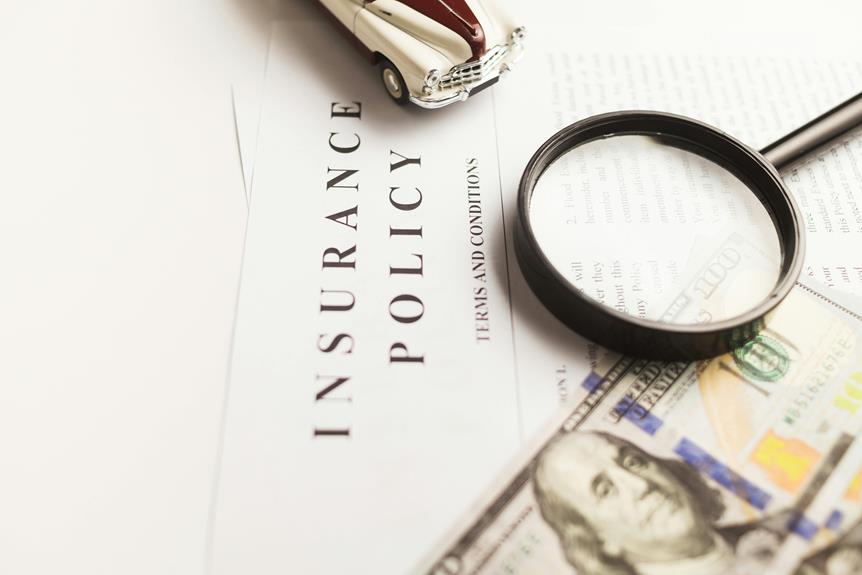
When selecting the right car insurance policy, consider types of coverage like liability, uninsured motorist, collision, comprehensive, and personal injury protection. Factors such as your driving record, vehicle type, and location influence premium rates. Get quotes from different providers, compare coverage and deductibles, and look for extra benefits and discounts. Customize your policy by adjusting deductibles, adding optional coverage, and tailoring liability to your assets and risks. These steps will help you make an informed decision about your car insurance needs.
Types of Coverage to Consider
When selecting your car insurance policy, consider the types of coverage that best suit your needs and budget. Liability coverage is essential, as it protects you in case you're at fault in an accident that causes injury or property damage. This coverage helps pay for the other party's medical expenses and repair costs.
Additionally, uninsured/underinsured motorist coverage is crucial to protect you if you're in an accident with a driver who doesn't have insurance or enough coverage. It ensures that you aren't left with expenses out of pocket.
Collision coverage is another vital option to consider. This coverage helps pay for repairs to your vehicle if you're in a crash, regardless of fault. Comprehensive coverage protects your car from non-collision incidents like theft, vandalism, or natural disasters.
Lastly, personal injury protection covers medical expenses for you and your passengers, no matter who's at fault. Evaluate your needs and budget carefully to choose the coverage that provides the best protection for your unique situation.
Factors Influencing Premium Rates
Factors that can influence premium rates for car insurance include your driving record, the type of vehicle you drive, and where you live. Your driving record is a significant factor that insurance companies consider. If you have a history of accidents or traffic violations, you may be deemed a higher risk and could face higher premiums. On the other hand, a clean driving record can lead to lower premium rates as it demonstrates responsible driving behavior.
The type of vehicle you drive also plays a role in determining your premium rates. Insurance companies assess factors such as the make and model of your car, its age, safety features, and likelihood of theft. Generally, safer and less expensive cars to repair tend to have lower insurance premiums.
Where you live can impact your car insurance rates as well. Urban areas with higher rates of traffic accidents or vehicle theft may result in higher premiums compared to rural areas. Additionally, areas prone to extreme weather conditions or natural disasters could also lead to increased insurance costs. It's essential to consider these factors when selecting a car insurance policy to ensure you're getting the best coverage at a competitive rate.
Comparing Quotes From Different Providers
To make an informed decision on your car insurance policy, compare quotes from different providers to ensure you get the best coverage at the most competitive rate.
Start by gathering quotes from several insurance companies. Online comparison tools can be helpful in this process, allowing you to input your information once and receive multiple quotes.
When comparing quotes, pay attention to the coverage limits, deductibles, and any additional benefits or discounts offered by each provider. While price is important, it's equally crucial to consider the level of coverage you'll receive for that price.
Don't forget to check the reputation and financial stability of the insurance companies you're considering. Reading reviews and looking into their customer service can give you insight into how they handle claims and interact with policyholders.
Tips for Customizing Your Policy
Consider tailoring your car insurance policy to your specific needs by customizing coverage options that align with your driving habits and financial situation.
One tip for customizing your policy is to adjust your deductibles. Choosing a higher deductible can lower your premium but means you'll pay more out of pocket in case of an accident. On the other hand, a lower deductible means higher premiums but less immediate expense if you need to make a claim.
Another way to customize your policy is by adding optional coverage such as roadside assistance, rental car reimbursement, or gap insurance. These additions can provide extra peace of mind and financial protection in specific situations.
Additionally, consider the level of liability coverage you need based on your assets and potential risks. By customizing these aspects of your car insurance policy, you can ensure you have the right coverage for your individual circumstances.
Conclusion
So remember, when choosing the right car insurance policy for you, consider the types of coverage you need, the factors that influence premium rates, and compare quotes from different providers.
Don't forget to customize your policy to fit your specific needs. By taking these steps, you can ensure that you're getting the best coverage at the best price for your vehicle.




